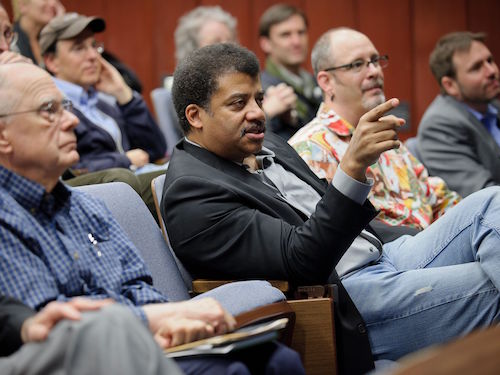 Evolution
Evolution
 Free Speech
Free Speech
Scientism, Values, and the Public Interest

Over at The American Conservative, Rod Dreher comments on a recent post by John Michael Greer, who writes The Archdruid Report. Despite their vastly differing worldviews (conservative Christian vs. druid!), Greer and Dreher agree on this: There are many questions that science can’t answer, not least about politics. Neil deGrasse Tyson is a case in point. Dreher’s headline says it all: “Scientists Make Terrible Politicians.”
Why should this be?
First, scientific and political reasoning are very different. Democracy is based on compromise between competing interests and values. One cannot use scientific reasoning to arrive at values. What science does is continually try to disprove hypotheses. It’s not about finding a workable compromise. Greer:
If you’re Lavoisier and you’re trying to figure out how combustion works, you don’t say, hey, here’s the oxygenation theory and there’s the phlogiston theory, let’s agree that half of combustion happens one way and the other half the other; you work out an experiment that will disprove one of them, and accept its verdict. What’s inadmissible in science, though, is the heart of competent politics.
One of the great intellectual crises of the ancient world, in turn, was the discovery that logic was not the solution to every human problem. A similar crisis hangs over the modern world, as claims that science can solve all human problems prove increasingly hard to defend, and the shrill insistence by figures such as Tyson that it just ain’t so should be read as evidence for the imminence of real trouble.
In other words, he’s talking about scientism, which is something we’ve commented on extensively in the past. Dreher also cites science writer Thomas Burnett:
Scientism today is alive and well, as evidenced by the statements of our celebrity scientists:
“The Cosmos is all that is or ever was or ever will be.” — Carl Sagan, Cosmos
“The more the universe seems comprehensible, the more it also seems pointless.” — Stephen Weinberg, The First Three Minutes
“We can be proud as a species because, having discovered that we are alone, we owe the gods very little.” — E.O. Wilson, Consilience
While these men are certainly entitled to their personal opinions and the freedom to express them, the fact that they make such bold claims in their popular science literature blurs the line between solid, evidence-based science, and rampant philosophical speculation. Whether one agrees with the sentiments of these scientists or not, the result of these public pronouncements has served to alienate a large segment of American society.
Maybe this is a good reason to think twice about controversial scientific issues. Scientism, which Dreher calls “the ideologically charged fallacious belief that science is the only legitimate way of knowledge,” animates those large scientific bodies that marginalize scientists with dissenting views on certain controversial questions. Discriminating against these minority scientists helps alienate that “large segment of American society” that Burnett worries about.
A 2016 survey probing attitudes about academic freedom suggests as much. Of respondents, 84 percent said that “attempts to censor or punish scientists for holding dissenting views on issues such as evolution or climate change are not appropriate in a free society.” Similarly, 86 percent affirmed that “disagreeing with the current majority view in science can be an important step in the development of new insights and discoveries in science.” And 88 percent said that “scientists who raise scientific criticisms of evolution should have the freedom to make their arguments without being subjected to censorship or discrimination.”
Scientism, it seems, is more problematic, in more ways, than some observers have realized.
Photo: Neil deGrasse Tyson, by NASA Ames Research Center [Public domain], via Wikimedia Commons.
